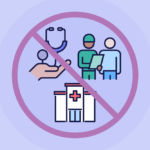Article
David vs. Goliath: The fight to keep rural hospitals independent
The financial problems facing rural hospitals are quite serious, with more than one-third of rural hospitals not receiving enough revenue to cover their costs. In fact, more than 700 rural hospitals lost money in 2022 and approximately 400 had losses greater than 5%. So, to some rural hospitals, the prospect of merging with a larger health system may seem like they’re being tossed a lifeline in a sea of financial chaos.
But aligning with larger health systems may not be the “cure all” that some think it is. The financial issues affecting rural hospitals do not disappear once they are acquired. Larger, for-profit systems will do what they deem “necessary” to ensure they stay financially viable, up to and including closing a rural hospital, rather than help keep the lights on.
In fact, a recent study found that rural hospitals affiliated with for-profit systems are four times more likely to close than those affiliated with a non-profit system. Just as concerning, another study found that rural hospitals that merged with larger systems were more likely to eliminate obstetric and surgical services and decrease their mental health and substance-abuse programs.
A recent study found that rural hospitals affiliated with for-profit systems are four times more likely to close than those affiliated with a non-profit system.
Rural hospitals are uniquely embedded in their communities, often the only source of healthcare services for many miles, including emergency care, primary care, rehabilitation, lab testing and more. Not only does the closing of a rural hospital increase the likelihood of death or disability in emergent situations, it can also lead to delayed diagnosis and/or inadequate treatment for patients unwilling or unable to travel farther for healthcare.

But if acquisition isn’t the answer, what can rural hospitals do instead? How can they drive change when the circumstances contributing to their financial turmoil are largely out of their control? The first step is finding partners that not only understand how important it is for rural organizations to remain independent, but actively work toward helping them achieve that goal.
I’m proud to say that Altera Digital Health is one such partner. You may have heard our recent announcement of Paragon® Denali, an electronic health record (EHR) natively built in the cloud, specifically designed for rural, critical access and community hospitals. Paragon Denali will act as a single platform to manage clinical and financial data without further straining staff, resources and budgets. Built on Microsoft Azure, Paragon Denali will also bring cloud-capable features and containerized services to smaller healthcare organizations, enabling faster, more informed care decisions and greater financial and operational efficiencies.
By optimizing the resources already available, rural hospitals will be better poised for success and independence moving forward. And truthfully, this is just scratching the surface of what rural and community hospitals can achieve with Altera. I’m extremely excited about Paragon Denali and the impact it’s going to have on organizations and patient care. To learn more about what Paragon Denali can do for your organization, go here.














